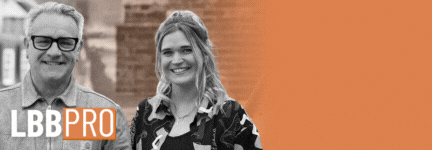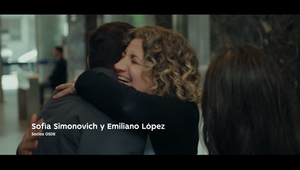
The Directors: Ale Rey

Ale Rey has a long career in advertising, he worked and learned directly from Fabián Bielinsky and Carlos Sorín from the local market, and foreign directors such as Noam Murro and Jonathan Glazer. These great storytellers left a mark on the director's gaze.
Today, Ale builds stories always held in good performances. His secret: the time he spends on castings and his management of actors leads him to work with number one agencies locally and internationally such as Ponce Buenos Aires, BBDO, Ogilvy, and Young & Rubicam, The Juju, Mullen Lowe, BBDO Chicago, and Adam&Eve London.
At the moment Ale is considered one of the most versatile directors in the local market with a lot of experience in acting, kids, and beauty and is represented by argentinacine, one of the most important production companies in Argentina and he is working abroad for several companies and clients. He won several international and local awards, and his latest work 'Dear Customer' for HSBC bank received the Silver Lion in the category of TV/ Cinema film at the 2022 Cannes Lions International Festival of Creativity.
Name: Ale Rey
Location: Buenos Aires, Argentina
Awards: Cannes 2024, Cannes 2022, London 2018
LBB> What are some upcoming projects that you're excited about? Tell us a bit about them?
Ale> I am currently in Chile filming a very beautiful campaign of real stories with a language very similar to documentary film and that challenges me as a filmmaker and as a person at the same time. Getting to know different and diverse realities and having the privilege of telling them is a great honour and a gift that comes with this profession.
I am also waiting for another project in Chile with a lot of action and one in Argentina with a lot of witty humour, parody and challenging framing.
Luckily, I am privileged to have all these projects on my radar at this time in the world.
LBB> What excites you in the advertising industry right now, as a director? Any trends or changes that open new opportunities?
Ale> I have been changing my goals, although learning something new in each project remains the main motivation.
Undoubtedly, the most interesting and yet complex thing is to find new ways to tell the story and be able to always adapt to what the client/agency needs.
It is a time when we have to be very alert and updated to find a solution, being aware of what we are telling and what budget we are handling so that we can provide a good technical and narrative approach and that the message reaches as far as possible.
LBB> What elements of a script sets one apart from the other and what sort of scripts get you excited to shoot them?
Ale> I like telling stories. Any story. I understand that in the advertising world, there are experts in cars, food, beauty, etc.
I particularly like working with actors and thinking very well about what I want to tell in each frame.
LBB> How do you approach creating a treatment for a spot?
Ale> The most important aspect is that I work as part of a team, which guarantees diverse perspectives and points of view that, in most cases, can enrich the proposal.
I always try to get my initial feelings down and start working from there, and then, we start shaping it.
I usually like starting from a clear concept, breaking down the idea to be able to convey what is needed with the right code and narrative genre or, at least to me, the one I think is the one that is needed. At times, it is humour; other times, sensitivity, etc., or all together.
LBB> If the script is for a brand that you're not familiar with/ don’t have a big affinity with or a market you're new to, how important is it for you to do research and understand that strategic and contextual side of the ad? If it’s important to you, how do you do it?
Ale> I always start from the premise that this is a profession in which ideologically, it is hard to agree on everything. But that happens in any job. Of course, there are causes that I find more noble than others and a few others that I wouldn't film under any circumstances.
Fortunately, there are hardly any of those causes because otherwise, the world would be a horrible place.
I empathise when the stories bring to the table some problem or solution to people's everyday problems.
In any case, whatever project I face, it's with the same commitment and adrenaline as always.
LBB> For you, what is the most important working relationship for a director to have with another person in making an ad? And why?
Ale> Today, the closeness and work between the three parties is more noticeable. Agency, client, production company. I believe that we are going through a great moment in that sense and that, in most cases, we feel the sense of a team and that the commercial is from a client to whom the agency gives the best of its know-how and the production company gives its own, and that each one is useful for the final product in its own way.
Regardless of this, my closest bond is and will always be with the creative team because it is to them that we have to give the best of ourselves, providing all possible solutions so that the idea they came up with looks as close as possible to what they imagined and told their clients.
LBB> What type of work are you most passionate about - is there a particular genre or subject matter or style you are most drawn to?
Ale> At the beginning of my career, I used to give a simple answer. I like projects that tell a story.
Today, I add to that the possibility of telling different stories and trying new storytelling languages.
Understanding that there are projects that don't need so much technical support is something I like to investigate. I also like the whole spectacle of trucks full of lights, the best camera, the best lenses, the cranes and the advanced grips.
But deep down, I am a storyteller who sometimes plays with sensitivity and sometimes with humour, and to that, I try to add an aesthetic imprint that identifies me and not just take it for granted that if the actors are good or the script is solid, the rest works by itself.
I'm always looking to reinvent myself. These days my challenge is to film synthetically, with a lot of meaning in a few shots.
LBB> What misconception about you or your work do you most often encounter and why is it wrong?
Ale> I am not sure if I should talk about mistakes but rather about moments or ways of filming. I often feel that once I have finished shooting, I would shoot it again in a different way.
I think that's what filmmaking is all about: trying over and over again until you find the best result, which, at the same time, is super subjective.
Anyway, I emphasise the constant movement of thinking over and over again a story or similar stories and being able to tell them from other points of view and with other resources.
I am one of those who think that everything is already invented and that we have the tools available, ready on a table and with that, sometimes with more resources and more time, sometimes with less, we have the challenge of using them in the best possible way, although it can always be better.
LBB> How do you strike the balance between being open/collaborative with the agency and brand client while also protecting the idea?
Ale> I believe that times have changed, and although there are hierarchies that are respected and continue to organise this job, there is also a positive advance in the project's conception as a whole, where the agency, the client, and the director and producer are breaking with the traditional and formal processes so that more and better information flows.
At the end of the project, this is perceived and represents a new challenge, which is to first choose the right people and then know how to combine all the tools and resources available.
LBB> What are your thoughts on opening up the production world to a more diverse pool of talent?
Ale> Unity is strength.
I think that the audio-visual world is increasingly nurturing from other disciplines, and that always enriches and works more to our advantage than to our disadvantage.
LBB> Are you open to mentoring and apprenticeships on set?
Ale> I am always open to learn or receive suggestions from anyone.
I am very clear that team work is essential and that even though I am the one who makes the important decisions, I often do it based on suggestions, whether they come from a meritorious person or any of the producers.
All those opinions are valuable to me and make the final result better.
LBB> What’s your relationship with new technology and, if at all, how do you incorporate future-facing tech into your work (e.g. virtual production, interactive storytelling, AI/data-driven visuals etc.)?
Ale> I must admit that I find it hard to keep up with developments and stay up to date. Everything happens so fast, and by the time we learn something new, it is already outdated.
However, I consider that all new technologies and working methods are tools, and the more we know how to use them, the better the results will be. A few months ago, I had to shoot a project with Unreal Engine.
The truth is that beforehand, I was a little apprehensive, but as I learned it and became more and more familiar with this resource, I found it to be a great tool for other future projects. I even feel capable of doing other projects of even greater complexity.
Today, what initially caused me some hesitation is part of a background that I have in mind when it comes to budgeting or doing my treatments.
LBB> Which pieces of your work do you feel show what you do best – and why?
Ale> HSBC, 'Dear Customer'
This is probably my favourite commercial. Putting together a movie scene and transforming it into a commercial is the dream of everyone who works in this field.
INECO, 'Bombero'
When advertising is about helping people, it's double the excitement for me. And the challenge of achieving this story in a single shot gave me a lot of pleasure.
I have a special affection for this commercial because it was filmed with real women doing what they liked the most, at the most photogenic times of the day and in one of the most beautiful cities (Rio de Janeiro).















